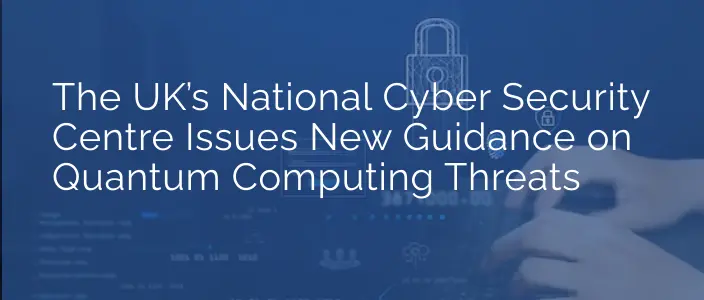News
The UK’s National Cyber Security Centre Issues New Guidance on Quantum Computing Threats

Read time: 3:00
Published April 7, 2025
The UK’s National Cyber Security Centre (NCSC) has issued new guidance to help you navigate the emerging threat of quantum computing. As quantum technologies advance, traditional encryption methods that protect sensitive data today may soon become ineffective. The NCSC emphasizes the need to act now by transitioning to quantum-resistant cryptography to safeguard your digital assets and future-proof your security measures.
Why Quantum Computing is a Threat
Quantum computers have the potential to solve complex mathematical problems much faster than classical computers. This poses a serious risk to current encryption methods such as RSA, Diffie-Hellman, and ECC, which are widely used to secure sensitive information like personal data, financial records, and intellectual property. If your organization relies on these methods, you’re vulnerable to quantum attacks in the future, even if the risk feels distant now.
A significant concern is the “store now, decrypt later” risk—cybercriminals could intercept encrypted data today and decrypt it later when quantum computers become powerful enough. This makes it crucial for you to transition to quantum-resistant encryption before quantum technology matures.
Key Components of NCSC’s Guidance
- Early Preparation is Essential
The NCSC stresses that you shouldn’t wait until quantum computers are widely available to begin preparing. While practical quantum computers capable of breaking encryption might still be years away, the time to act is now. You need to assess your current encryption methods, identify vulnerabilities, and develop a strategy for adopting quantum-resistant solutions. Early action can protect your organization from the future risk of quantum attacks. - Phased Migration Plan
The NCSC outlines a phased approach to adopting Post-Quantum Cryptography (PQC), with a timeline extending to 2035. Here’s how you can prepare: - Up to 2028: Start by identifying cryptographic services that may be vulnerable to quantum threats. Develop a comprehensive migration plan, and begin researching quantum-resistant solutions.
- 2028–2031: Execute high-priority migrations, focusing on transitioning your most critical systems to PQC. Stay flexible and adjust as quantum technologies evolve.
- 2031–2035: Complete the transition by ensuring all systems, services, and products are secure with quantum-resistant cryptography.
- Adopt Hybrid Cryptographic Solutions
Quantum computers won’t fully emerge overnight. In the interim, you can adopt hybrid cryptographic solutions, which combine classical encryption with quantum-resistant algorithms. This ensures an extra layer of protection while you gradually move towards full PQC implementation.
The Global Push for Quantum Security
The UK isn’t the only country preparing for the quantum era. Countries like the United States and members of the European Union are also taking proactive steps. The U.S. National Institute of Standards and Technology (NIST) has initiated global efforts to standardize PQC algorithms, while the EU has developed its own post-quantum security roadmap. The global context shows that quantum threats are a collective concern, requiring international cooperation to protect digital infrastructure.
How Locktera Helps You Prepare for Quantum Security
Locktera offers an all-in-one solution to help you navigate the transition to quantum security. Using hybrid encryption, Locktera combines classical encryption with PQC techniques, providing robust protection during this shift. This ensures your data is secured against current threats while preparing for future quantum risks.
Locktera also enhances security with advanced access controls and real-time traceability. You can implement role-based permissions, ensuring that only authorized personnel have access to sensitive data. With real-time tracking of file access and modifications, Locktera also helps you maintain compliance with regulations like GDPR and the new quantum security guidelines.
Why This Matters for Your Business
While quantum computers may be years away from posing an immediate threat, the need to prepare is urgent. If your organization relies on encryption to secure sensitive data—especially if you’re in finance, healthcare, telecommunications, or defense—the risks of not acting now are significant. Data encrypted today could be vulnerable to future decryption by quantum computers, leading to potential privacy breaches and security risks.
Following the NCSC’s guidance will help you mitigate these risks, ensuring that your systems remain secure and resilient as quantum computing technology advances. Businesses that fail to adapt could face severe consequences, from data breaches to regulatory penalties.
Conclusion
The future quantum era brings new challenges to data security, but acting now can help you stay ahead. By following the NCSC’s guidance and implementing Locktera’s hybrid encryption and advanced access controls, you’ll be better positioned to protect your organization’s sensitive data against quantum threats. Preparing today ensures your business remains secure, compliant, and resilient as the quantum landscape evolves.
